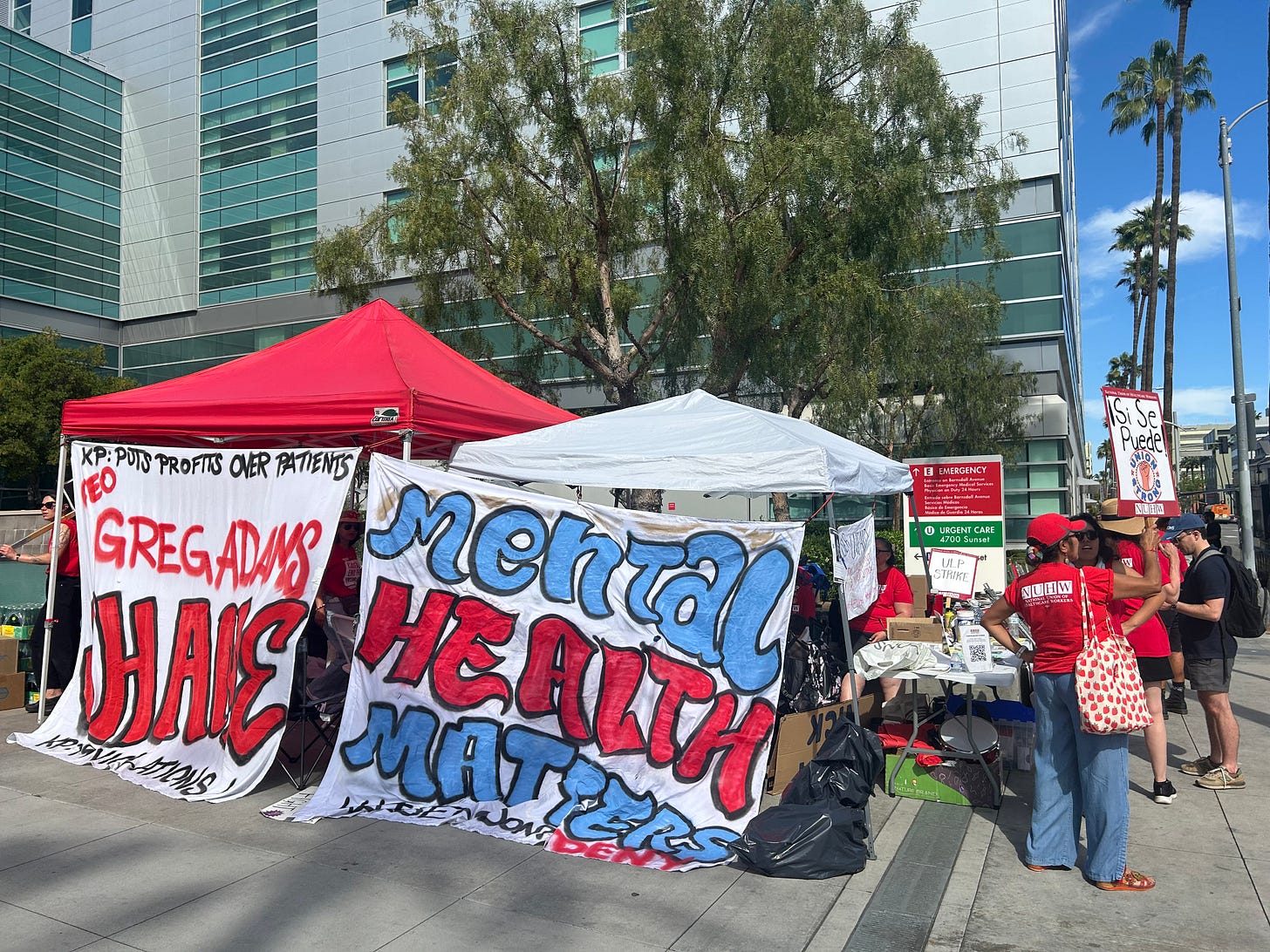Mental health professionals at the giant consortium Kaiser Permanente started a five-day hunger a strike in Los Angeles on Monday this week, an escalation of a broader strike that has ground on since October 2024. The workers are fighting for more time spent with patients and better pay, and against algorithmic triage and an assembly line-style of providing mental healthcare.
So, on the last day of the hunger strike, I went down to the picket line at the Kaiser Permanente Los Angeles Medical Center in East Hollywood. Chants sporadically erupted among the healthcare workers assembled in bright red NUHW t-shirts. Those on hunger strike were sitting on lawn chairs in the shade of a pop-up shelter, smiling wearily. By the time I arrived, they’d gone over 100 hours without food.
This day was also, the Kaiser workers told me, the day that they’d broken a record—at 173 days, theirs was now the longest mental health worker strike in the US. Not a record you want to break, exactly.
“We want more time to be with our patients,” Adriana Webb, a medical social worker at Kaiser tells me. Webb hasn’t eaten for five days. “Kaiser treats therapy like a factory, they make therapists see patients back to back to back with no breaks,” she says. “It’s exhausting. You can’t take care of patients if you can’t take care of yourself, if you can’t go to the bathroom.”
Webb is tired and pale, and she tells me she’s lost 14 pounds this week. But she’s also lucid and entirely cogent. “I think around Wednesday the brain fog lifted,” she says. She’s able to fire off her concerns with Kaiser with rapid-fire eloquence. “Kaiser wants us to do more with less. They treat us like robots, like it’s an assembly line—therapy does not work that way.”
One of the core issues here—along with the fact that Kaiser is not paying southern California mental health workers what it pays their Northern California counterparts, and that hundreds of therapists aren’t receiving pensions—is the aforementioned and possibly illegal practice of algorithmic triage.
California law requires that a trained and qualified health professional—a physician, registered nurse, or such—to do triage, or screen patients to determine the urgency of their care. So when a patient with a mental health issue calls their provider, it’s supposed to be a trained therapist, nurse, or doctor answering the call to asses the patient’s needs. But Kaiser has been hiring clerks and relying on a semi-automated and algorithmic system to do these screenings—even for suicide assessments.
“They have clerks and non-clinical people triaging people and doing suicide assessments, and that doesn’t work,” Webb says. “Because if you ask a patient, ‘have you had any thoughts of harming yourself,’ and they kind of go ‘no?’ they can just check the no box.” And that patient doesn’t get mental healthcare—even if they truly need it.
This triage system, which has callers answer a series of basic questions about their mental wellbeing, feeds the answers into an algorithm that determines whether or not the patient should receive care. The purpose of this system, of course, is to automate a crucial healthcare service, in order to help Kaiser save on labor costs.
A complaint filed this week by the National Union of Healthcare Workers details the scope of the issue:
In 2019, Kaiser began implementing aggressive changes to its triage system in order to cut costs. It replaced licensed therapists with unlicensed, untrained clerical staff and sharply reduced the duration of each triage assessment to fewer than five minutes. During each triage assessment, an unlicensed clerical staffer employed by Kaiser poses questions to an enrollee, including about suicidal and homicidal ideation, and enters information into a Tridiuum (now LUCET) software tool. An algorithm then calculates an acuity score and, based on the score, generates a response that guides the clerical staffer in scheduling the enrollee for subsequent care. In most cases, these triage determinations are not reviewed by licensed and trained therapists. Each week, Kaiser uses this system to triage thousands of enrollees with behavioral health disorders.
This is not only corner-cutting—before 2019, triage would take 10-15 minutes, with a trained professional—but downright dangerous, the nurses say.
“For example, there’s a patient that might describe feeling anxious, but you might find out later they have an eating disorder—which is urgent,” says Ligia Pacheco, a Kaiser psychiatric social worker. “That should be treated right away.” An untrained clerk and an algorithm might miss such nuances, and arrive at the wrong conclusion altogether. “Or if you ask ‘do you have any suicidal ideation?’ and say if a patient asked me ‘what is that?’ I can say, ‘ideation is just the idea. But do you have a plan, do you have means?’ and so on. The algorithms don’t have those follow up questions, so it puts patients at great risk of great harm.”
The Kaiser mental health workers have been fighting that system since its inception, and Kaiser has thus far refused to budge. The fiasco with algorithmic triage also makes the therapists and healthcare workers worried about how Kaiser might further push AI in the future. They’re fighting for a contract that demands that any AI systems be instituted only with their input and approval—and against top-down systems that hand all the power to managment.
“AI puts patients in great danger,” Pacheco says. “It takes away the human aspect, right? Patients want to be heard by humans.”
Kaiser, in response to the hunger strike, publicly expressed concern for the workers, and management agreed to return to the bargaining table next week. But how productive that will prove, of course, remains to be seen.
The therapists, for their part, remain resolute.
“We didn’t come this far to only come this far,” Webb says. “It doesn’t make sense to go back without an equitable contract. Kaiser has $70 billion in reserves. They can afford to provide us with an equitable contract, which will benefit them and their patients.”
